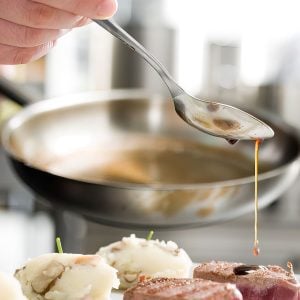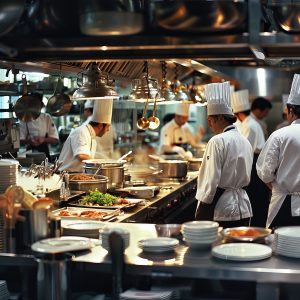The Difference Between Cooking for Pleasure or As A Career
Most top culinary institutions and trade schools focus on students aiming for careers in restaurants or hotels. However, the goal doesn’t always have to be a job in the food industry. Increasingly, students take professional-level culinary courses simply to gain the skills to cook better at home.
This trend reflects our growing interest in the culinary world. Cooking shows on the Food Network, diverse cuisines, and five-star restaurants in even small cities have made being a “foodie” a badge of honor.
Cooking for pleasure and cooking for business are two distinct approaches, each with different motivations, goals, and considerations.
Purpose and Motivation:
Cooking for pleasure comes from personal enjoyment, creativity, and a desire to nourish oneself and others. It’s often a hobby or self-expression, offering relaxation and the joy of creating delicious meals.
Cooking for business focuses on profit and professional goals. Chefs prepare meals to sell, whether in restaurants or catering. The aim is to meet customer preferences, maximize efficiency, and maintain quality to generate revenue.
Creativity and Experimentation:
Cooking for pleasure allows more room for creativity and experimentation. Home cooks explore new ingredients, cuisines, and techniques without the commercial pressure.
Cooking for business requires balancing creativity with consistency. Chefs must consider cost, scalability, and customer preferences to ensure their dishes are commercially viable.
Time and Efficiency:
Cooking for pleasure is relaxed. Cooks take their time, enjoying both the process and the result.
Cooking for business is fast-paced. Chefs must work quickly to meet service demands while keeping waste to a minimum and maintaining quality.
Financial Considerations:
Cooking for pleasure doesn’t consider financial factors. It’s about personal enjoyment, not profit.
Cooking for business, however, requires careful financial planning. Chefs must manage ingredient costs, pricing, and profit margins to ensure sustainability.
Both approaches offer fulfillment. Whether for personal joy or as a profession, the love of food and creating memorable experiences unites them.
Is Culinary School Worth the Costs?
Deciding if culinary school is worth the cost requires careful thought. You must consider career goals, finances, and personal aspirations. While culinary school offers valuable skills and opportunities, its worth depends on individual circumstances.
For aspiring chefs focused on a culinary career, the culinary school provides essential training in various techniques, kitchen management, and culinary theory. It offers hands-on experience and exposure to different cuisines, equipping students with the skills needed for success. Additionally, culinary school often provides networking opportunities with professionals and access to internships or job placements, which can fast-track career advancement.
However, the cost of culinary school can be high. Tuition, fees, and living expenses add up quickly. For some, taking on student loans or using savings may not be possible, especially with the modest starting salaries in the industry. In these cases, gaining experience through apprenticeships or entry-level restaurant jobs might be a more cost-effective choice.
Success in the culinary field often relies as much on experience as formal education. Many top chefs have worked their way up, learning on the job and refining their skills through hands-on experience. For some, practical experience in kitchens might offer a more affordable and efficient route to success.
Ultimately, culinary school’s worth depends on your personal situation. For those who can afford it and are committed to a culinary career, it provides invaluable training and networking. However, for others, practical experience through apprenticeships or entry-level positions might be a more financially sustainable option.
What About the Time Investment?
Another factor to consider is the time required for culinary school. Programs vary in length, from several months to a few years.
Shorter programs, like certificates or diplomas, can be completed in less than a year. These programs focus on core culinary skills, preparing students for entry-level positions quickly. While they’re a faster way to enter the workforce, they may not offer the depth of knowledge found in more extended programs.
Longer programs, such as associate’s or bachelor’s degrees, typically take two to four years to complete. These programs cover more, including techniques, kitchen management, nutrition, and menu development. They may also include internships or externships, offering real-world experience in professional kitchens.
Consider your career goals and financial resources when deciding on the time commitment. Longer programs provide comprehensive training and can lead to higher-paying positions, but they delay entry into the workforce. Shorter programs offer a quicker path to employment but may not provide the same depth of education.
Ultimately, the time investment depends on your personal priorities and goals. Consider your career aspirations, finances, and the type of education that best aligns with your needs.
“Trying On” a Culinary Education
One of the benefits of these individual courses that aren’t highly advertised by the culinary schools that offer them is that they provide students with the opportunity to “try on” a culinary career for a few short weeks. In addition, taking one or two courses allows you to determine the amount of work and studying that goes into culinary school without committing to a two- or four-year degree.
These courses may also help you determine whether you’d like to learn within the structure of a culinary institution or prefer a more hands-on approach in an actual restaurant kitchen.
Few students in any field enter their career training without prior knowledge. For example, almost no one goes to school to become a graphic designer without any knowledge of drawing or computers, and few pharmacy technician students don’t already understand the human body and how they might like to help patients in a healthcare setting.
In the same way, introductory culinary courses can be a gateway to a future in the cooking field – whether you plan on doing it for business or pleasure.













